Berenice Abbott
Berenice Abbott (July 17, 1898 – December 9, 1991),[2] née Bernice Alice Abbott, was an American photographer best known for her portraits of between-the-wars 20th century cultural figures, New York City photographs of architecture and urban design of the 1930s, and science interpretation in the 1940s to 1960s.
Berenice Abbott | |
|---|---|
 Abbott by Hank O'Neal in New York City, November 18, 1979 | |
| Born | Bernice Alice Abbott July 17, 1898 |
| Died | December 9, 1991 (aged 93) Monson, Maine, US |
| Resting place | New Blanchard Cemetery, Blanchard, Maine, U.S.[1] |
| Nationality | United States |
| Known for | Photography |
Early years
Abbott was born in Springfield, Ohio[3] and brought up there by her divorced mother, née Lillian Alice Bunn (m. Charles E. Abbott in Chillicothe OH, 1886).
She attended Ohio State University for two semesters, but left in early 1918 when her professor was dismissed because he was a German teaching an English class.[4] In Paris, she became an assistant to Man Ray, who wanted someone with no previous knowledge of photography.[5] Abbott took revealing portraits of Ray's fellow artists.[6]
Trip to Europe, photography, and poetry
Her university studies included theater and sculpture.[7] She spent two years studying sculpture in Paris and Berlin.[2] She studied at the Académie de la Grande Chaumiere in Paris and the Prussian Academy of Arts in Berlin.[8] During this time, she adopted the French spelling of her first name, "Berenice," at the suggestion of Djuna Barnes.[9] In addition to her work in the visual arts, Abbott published poetry in the experimental literary journal transition.[10] Abbott first became involved with photography in 1923, when Man Ray hired her as a darkroom assistant at his portrait studio in Montparnasse. Later, she wrote: "I took to photography like a duck to water. I never wanted to do anything else." Ray was impressed by her darkroom work and allowed her to use his studio to take her own photographs.[11] In 1921 her first major works was in an exhibition in the Parisian gallery Le Sacre du Printemps. After a short time studying photography in Berlin, she returned to Paris in 1927 and started a second studio, on the rue Servandoni.[12]
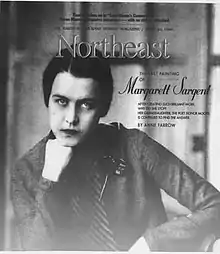
Abbott's subjects were people in the artistic and literary worlds, including French nationals (Jean Cocteau), expatriates (James Joyce), and others just passing through the city. According to Sylvia Beach, "To be 'done' by Man Ray or Berenice Abbott meant you rated as somebody".[13] Abbott's work was exhibited with that of Man Ray, André Kertész, and others in Paris, in the "Salon de l'Escalier"[14] (more formally, the Premier Salon Indépendant de la Photographie), and on the staircase of the Théâtre des Champs-Élysées. Her portraiture was unusual within exhibitions of modernist photography held in 1928–1929 in Brussels and Germany.[15]
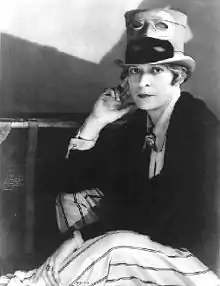
In 1925, Man Ray introduced her to Eugène Atget's photographs. She became interested in Atget's work,[16] and managed to persuade him to sit for a portrait in 1927.[17] He died shortly thereafter. She acquired the prints and negatives remaining in Eugène Atget's studio at his death in 1927.[18] While the government acquired much of Atget's archive – Atget had sold 2,621 negatives in 1920, and his friend and executor André Calmettes sold 2,000 more immediately after his death[19] — Abbott was able to buy the remainder in June 1928, and quickly started work on its promotion. An early tangible result was the 1930 book Atget, photographe de Paris[20], in which she is described as photo editor. Due to a lack of funding, Abbott sold a one-half interest in the collection to Julien Levy for $1,000.[21] Abbott's work on Atget's behalf would continue until her sale of the archive to the Museum of Modern Art in 1968. In addition to her book The World of Atget (1964), she provided the photographs for A Vision of Paris (1963), published a portfolio, Twenty Photographs, and wrote essays.[22] Her sustained efforts helped Atget gain international recognition.
Changing New York
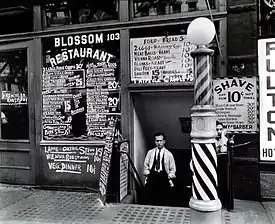
In early 1929, Abbott visited New York City, ostensibly with the goal of finding an American publisher for Atget's photographs. Upon seeing the city again, Abbott recognized its photographic potential. She went back to Paris, closed up her studio, and returned to New York in September. There, over the next decade, she focused on documentary photography and on portraying the city as it underwent a transformation into a modern metropolis.[23] During this period, Abbott became a central figure and important bridge between the photographic hubs and circles of Paris and New York City.[24]
Her first photographs of New York were taken with a hand-held Kurt-Bentzin camera, but soon she acquired a Century Universal camera, which produced 8 × 10-inch negatives.[25] Using this large format camera, Abbott photographed the city with the diligence and attention to detail she had so admired in Eugène Atget. After Atget's death in 1927, she and Julien Levy had acquired a large portion of his negatives and glass slides, which she then brought over to New York in 1929.[24] Her subsequent work provides a historical chronicle of many now-destroyed buildings and neighborhoods in Manhattan. Abbott had her first exhibition in New York in 1937 entitled "Changing New York" at the Museum of the City of New York. A book under the same title was also published, depicting the city's physical transformation, including changes to its neighborhoods and the replacing of low rise buildings with skyscrapers.[26]
Abbott worked on her New York project independently for six years, unable to get financial support from organizations (such as the Museum of the City of New York), foundations (such as the Guggenheim Foundation), or individuals. She supported herself with commercial work and with teaching gigs at the New School of Social Research beginning in 1933.[27]
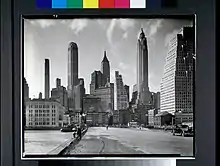
In 1935, Abbott was hired by the Federal Art Project (FAP)[2] as a project supervisor for her "Changing New York" project. While she continued to take photographs of the city, she hired assistants to help her in the field and in the office. This arrangement allowed Abbott to devote all her time to producing, printing, and exhibiting her photographs. By the time she resigned from the FAP in 1939, she had produced 305 photographs that were then deposited at the Museum of the City of New York.[25]
Abbott's project was primarily a sociological study embedded within modernist aesthetic practices. She sought to create a broadly inclusive collection of photographs that together suggest a vital interaction between three aspects of urban life: the diverse people of the city; the places they live, work and play; and their daily activities. It was intended to empower people by making them realize that their environment was a consequence of their collective behavior (and vice versa). Moreover, she avoided the merely pretty in favor of what she described as "fantastic" contrasts between the old and the new, and chose her camera angles and lenses to create compositions that either stabilized a subject (if she approved of it), or destabilized it (if she scorned it).[28]
.jpg.webp)
Abbott's ideas about New York were highly influenced by Lewis Mumford's historical writings from the early 1930s, which divided American history into a series of technological eras. Abbott, like Mumford, was particularly critical of America's "paleotechnic era", which, as he described it, emerged at the end of the American Civil War, a development other historians have dubbed the Second Industrial Revolution. Like Mumford, Abbott was hopeful that, through urban planning efforts (aided by her photographs), Americans would be able to wrest control of their cities away from paleotechnic forces and bring about what Mumford described as a more humane and human-scaled, "neotechnic era". Abbott's agreement with Mumford can be seen especially in the ways that she photographed buildings that had been constructed in the paleotechnic era – before the advent of urban planning. Most often, buildings from this era appeared in Abbott's photographs in compositions that made them look downright menacing.[28]
In 1935, Abbott moved into a Greenwich Village loft with art critic Elizabeth McCausland, with whom she lived until McCausland's death in 1965. McCausland was an ardent supporter of Abbott, writing several articles for the Springfield Daily Republican, as well as for Trend and New Masses (the latter under the pseudonym Elizabeth Noble). In addition, McCausland contributed the captions for Changing New York[29] which was published in 1939. In 1949, her photography book Greenwich Village Today and Yesterday was published by Harper & Brothers.[30]
Ralph Steiner wrote in PM that Abbott's work was "the greatest collection of photographs of New York City ever made."[31]
As the city and architecture are two main themes in Abbott's photographs, her work has been commented on and reviewed together with the work of Eugène Atget and Amanda Bouchenoire, in the book Structure and harmony. Cities and architectures, where the author Jerome Saltz analyzes historicist perspectives and considers their aesthetic implications: "(...) the three authors coincide in the search for and exaltation of intrinsic beauty in their objectives, regardless of quality and clarity of their references."[32]
Gallery
.jpg.webp) Pike Street at Henry Street (1936)
Pike Street at Henry Street (1936).jpg.webp) Automat in Manhattan (1936)
Automat in Manhattan (1936).jpg.webp) Pennsylvania Station (1936)
Pennsylvania Station (1936).jpg.webp) Detail of Manhattan Bridge (1936)
Detail of Manhattan Bridge (1936).jpg.webp) Wanamaker's department store, Fourth Avenue and Ninth Street (1936)
Wanamaker's department store, Fourth Avenue and Ninth Street (1936)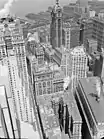 Financial District rooftops (1938)
Financial District rooftops (1938).jpg.webp) Seventh Avenue, looking south from 35th Street (1935)
Seventh Avenue, looking south from 35th Street (1935).jpg.webp) Flatiron Building (1938)
Flatiron Building (1938).jpg.webp) House doorway on East 4th Street, Manhattan (1937)
House doorway on East 4th Street, Manhattan (1937).jpg.webp) Hot dog stand, North Moore Street, Manhattan (1936)
Hot dog stand, North Moore Street, Manhattan (1936) Hardware store on the Bowery in Manhattan (1938)
Hardware store on the Bowery in Manhattan (1938)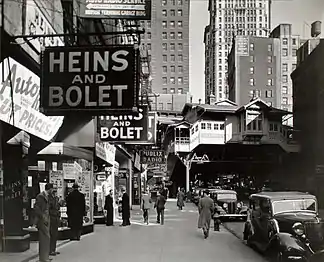 Radio Row at Cortlandt Street (1936)
Radio Row at Cortlandt Street (1936)
Beyond New York City
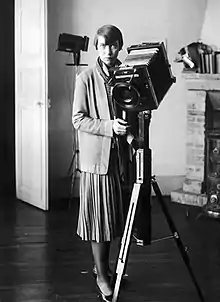
In 1934, Henry-Russell Hitchcock asked Abbott to photograph two subjects: antebellum architecture and the architecture of H. H. Richardson. Two decades later, Abbott and McCausland traveled US 1 from Florida to Maine, where Abbott photographed small towns and growing automobile-related architecture.[2] The project resulted in more than 2,500 negatives.
Shortly after the trip, Abbott underwent a lung operation. She was told she should move from New York City due to air pollution. She purchased a rundown home in Blanchard, Maine along the banks of the Piscataquis River for US$1,000. Later, she moved to nearby Monson and remained in Maine until her death in 1991. Most of her work is shown in the United States, but a number of photographs are shown in Europe.
Abbott's last book was A Portrait of Maine (1968).
Approach to photography
Abbott was part of the straight photography movement,[33] which stressed the importance of photographs being unmanipulated in both subject matter and developing processes.[34] She also disliked the work of pictorialists who had become popular during a substantial span of her career, leaving her work without support from this school of photographers. Most of Abbott's work was influenced by what she described as her unhappy and lonely childhood. This gave her the strength and determination to follow her dreams.[35]
Throughout her career, Abbott's photography was very much a reflection of the rise in development of technology and society. Her works documented and extolled the New York landscape. This was guided by her belief that a modern-day invention such as the camera deserved to document the 20th century.[36]
Scientific work
In addition to her photography, Abbott co-founded a company, the "House of Photography," which developed, promoted and sold photographic equipment and devices from 1947 to 1959.[37] Abbott's inventions included a distortion enlarging easel, which created unusual effects on images, and the telescopic lighting pole, known today by many studio photographers as an "autopole," to which lights can be attached at any level. Owing to poor marketing, the House of Photography quickly lost money, and with the deaths of two designers, the company closed.[38]
Abbott's style of straight photography helped her make important contributions to scientific photography. She once stated, “We live in a world made by science. There needs to be a friendly interpreter between science and the layman. I believe photography can be this spokesman, as no other form of expression can be.”[39]
From 1958 to 1960, she produced a series of photographs for a high-school physics textbook, developed by the Physical Science Study Committee project based at MIT to improve secondary school physics teaching. Her work included images of wave patterns in water and stroboscopic images of moving objects, such as Bouncing ball in diminishing arcs, which was featured on the cover of the textbook.[40] She contributed to the understanding of physical laws and properties of solids and liquids though her studies of light and motion.[41]
Between 1958 and 1961, she made a series of photographs for Educational Services Inc., which were later published. They were subsequently presented by the Smithsonian Institution in an exhibition titled Image of Physics.[41] In 2012, some of her work from this era was displayed at the MIT Museum in Cambridge, Massachusetts.[42]
Personal life
The film Berenice Abbott: A View of the 20th Century, which showed 200 of her black and white photographs, suggests that she was a "proud proto-feminist"; someone who was ahead of her time in feminist theory. Before the film was completed she questioned, "The world doesn't like independent women, why, I don't know, but I don't care." She identified publicly as a lesbian.[43]
She lived with her partner, art critic Elizabeth McCausland, for 30 years.[34]
Abbott's life and work are the subject of the 2017 novel The Realist: A Novel of Berenice Abbott, by Sarah Coleman.[44]
Notable photographs
- Under the El at the Battery, 1932.[45]
- New York at Night, 1932.[46]
- Tempo of the City I, 1938.[47]
- James Joyce, 1928.[48]
- Jay Street #115, New York, c.1936.[49]
- Automat, 977 Eighth Avenue, New York, 1936.[50]
- Radio Row, Cortland Street, Manhattan, c. 1936.[51]
- Marie Laurencin, Paris, c.1925.[52]
- Triboro Barber School, New York, 1935.[53]
- The Hands of Jean Cocteau, 1927.[54]
- Fifth Avenue Coach Company, New York, 1932.[55]
- Edward Hopper in His Studio, 1949.[56]
- Fifth Avenue, Nos. 4,6,8, 1936.[57]
- Flatiron Building, Broadway and Fifth Avenue, New York City, 1938.[58]
- Father Duffy, Times Square, 1937.[59]
- Gunsmith and Police Department Headquarters, 1937.[60]
- Church of God, 1936.[61]
- Eugene Atget, 1927.[62]
Bibliography
Books of photographs by Abbott:
- 1939 Changing New York. New York: Dutton, 1939. With text by Elizabeth McCausland.[2]
- 1949 Greenwich Village: Yesterday and Today. New York: Harper, 1949. With text by Henry Wysham Lanier.
- 1968 A Portrait of Maine. New York: Macmillan, 1968. With text by Chenoweth Hall.
Other books by, or with major contributions from, Abbott:
- 1930 Atget, photographe de Paris. Paris: Henri Jonquières; New York: E. Weyhe, 1930. (As photograph editor.)[63]
- 1941 A Guide to Better Photography. New York: Crown, 1941[64] Revised edition: New Guide to Better Photography (New York: Crown, 1953)[65]
- 1948 The View Camera Made Simple. Chicago: Ziff-Davis, 1948[66]
- 1956 Twenty Photographs by Eugène Atget 1856–1927 (portfolio of silver prints by Abbott from original Atget negatives in her possession)[67]
- 1963 A Vision of Paris: The Photographs of Eugène Atget, the Words of Marcel Proust. New York: Macmillan, 1963. Edited by Arthur D. Trottenberg[68]
- 1964 The World of Atget. New York: Horizon, 1964.[69] (And later editions.)
- 1964 Magnet. Cleveland: World, 1964. With text by Evans G. Valens.[70]
- 1965 Motion. London: Longman Young, 1965. With text by Evans G. Valens[71]
- 1968 A Portrait of Maine. NY: Macmillan, 1968. With text by Chenoweth Hall[72]
- 1969 The Attractive Universe: Gravity and the Shape of Space. Cleveland: World, 1969. With text by Evans G. Valens[73]
- 2008 Berenice Abbott. Germany/New York: Steidl, 2008. 2v. Edited by Hank O'Neal and Ron Kurtz.[74] ISBN 3-86521-592-0
- 2010 Berenice Abbott". London: Thames & Hudson, 2010,[75] Introduction by Hank O'Neal
- 2012 Berenice Abbott: Documenting Science. Göttingen: Steidl, 2012.[76] Edited by Ron Kurtz, with introduction by Julia Van Haaften.
- 2014 The Unknown Berenice Abbott. Göttingen: Steidl, 2014. 5v. Edited by Ron Kurtz and Hank O'Neal[77]
- 2015 Berenice Abbott: Paris Portraits. Göttingen, Germany: Steidl; New York: Commerce Graphics, 2016. Edited by Hank O'Neal[78]
Anthologies of and/or about Abbott's works:
- 1970 Berenice Abbott: Photographs. New York: Horizon, 1970; reprinted, Washington, D.C.: Smithsonian Institution Press, 1990[79]
- 1982 O'Neal, Hank. Berenice Abbott: American Photographer. New York: McGraw-Hill, 1982.[80] British title: Berenice Abbott: Sixty Years of Photography. London: Thames & Hudson, 1982[81]
- 1986 Berenice Abbott, fotografie / Berenice Abbott: Photographs. Venice: Ikona, 1986[82]
- 1989 Van Haaften, Julia, ed. Berenice Abbott, Photographer: A Modern Vision. New York: New York Public Library, 1989. [Winner, American Association of Museums' exhibition catalog design award][83] ISBN 0-87104-420-X
- 2009 Shimizu, Meredith Ann TeGrotenhuis. "Photography in Urban Disclosure: Berenice Abbott's Changing New York and the 1930s," Ph.D. dissertation, Northwestern University, 2009[84]
- 2012 Morel, Gaëlle. Berenice Abbott. Paris: Éditions Hazan, 2012[85]
- 2015 Berenice Abbott. Aperture Masters of Photography 9, by Julia Van Haaften. New York: Aperture, 1988; trilingual edition, 1997;[86] completely revised edition, with new photos and text, 2015.[87] [Chinese translation 2015[88]
Solo exhibitions
- Weyhe Gallery, New York, NY, November 1930[89]
- Photographs by Berenice Abbott at Julien Levy Gallery, New York, NY, September 26 – October 15, 1932
- New York Photographs by Berenice Abbott at Museum of the City of New York, New York, NY, October 1934 – January 1935
- New York Photographs by Berenice Abbott at Museum of Fine Arts, Springfield, MA, March 1935
- New York Photographs by Berenice Abbott at Jerome Stavola Gallery, Hartford, CT, April 1935
- New York Photographs by Berenice Abbott at Fine Arts Guild, Cambridge, MA, April 10–15, 1935
- Changing New York, Washington Circuit, Federal Art Project, traveling exhibition, 1936
- Changing New York at Museum of the City of New York City, NY, October 20, 1937 – January 3, 1938
- Changing New York at Teachers College Library, New York, NY, November 1937
- Solo exhibition at Hudson D. Walker Gallery, New York, NY, April 1938
- Changing New York at New York State Museum, Albany, NY, July 1938
- Changing New York at Federal Art Gallery, New York, NY, April 11–22, 1939
- Solo exhibition at Architectural League, New York, NY, April 1939
- Changing New York at Lawrenceville School, Lawrence Township, NJ, May 1939
- Changing New York at Photo League Gallery, New York, NY, July 1939
- Changing New York at New York State Employment Service, New York, NY, November–December 1939
- Changing New York at Walton High School, New York, NY, December 1939
- Photographs of New York by Berenice Abbott at The Cooper Union Library, New York, NY, November–December 1940
- Berenice Abbott, The Museum of Modern Art, New York, NY, December 1970 – February 1971
- Berenice Abbott: The Red River Photographs at Hudson D. Walker Gallery at the Fine Arts Work Center, Provincetown, Massachusetts, August–September 1979[90]
- Berenice Abbott: The 20s and the 30s, International Center of Photography, New York City, November 22, 1981 – January 10, 1982
- Beauty of Physics at New York Academy of Sciences, New York, NY, January–April 1987[91]
- Berenice Abbott, Photographer: A Modern Vision, The New York Public Library, New York NY, October 1989 – January 1990 (Traveled to Metropolitan Museum of Photography [Tokyo, Japan], Toledo [Ohio] Museum of Art, Corcoran Gallery of Art [Washington DC], and Portland [ME] Museum of Art, 1990–1992)
- Documenting New York: Photographs by Berenice Abbott, Dallas Museum of Art, Dallas, Texas,1992
- Berenice Abbott: Portraits, New York Views, and Science Photographs from the Permanent Collection, International Center of Photography, New York, NY, 1996
- Berenice Abbott's Changing New York, National Museum of Women in the Arts, Washington D.C.,1935–1939, 1998–99
- Berenice Abbott: Vintage Photographs of New York from the 1930s, Lee Gallery, Winchester, MA, September 1999
- Berenice Abbott: Science Photographs, The New York Public Library, New York NY, October 1999 – January 2000
- Berenice Abbott: All About Abbott, Howard Greenberg Gallery, New York, NY, September–November 2006
- Making Science Visible: The Photography of Berenice Abbott, The Fralin Museum of Art, Virginia, 2012
- Berenice Abbott (1898–1991), Photographs, Jeu de Paume, Paris, France, February–April 2012
- Berenice Abbott: Photography and Science: An Essential Unity, MIT Museum, Cambridge, Massachusetts, May–December 2012
- Berenice Abbott, Beetles & Huxley Gallery, London, England, October–November 2015
- Berenice Abbott – Photographs, Martin-Gropius-Bau, Berlin, Germany, January–March 2016
Collections
Abbott's work is held in the following permanent collections:
- New York Public Library[92][93][94]
- Museum of the City of New York[95]
- The Jewish Museum of New York)[96]
- Smithsonian American Art Museum[97]
- The Phillips Collection, Washington, D.C.[98]
- New Mexico Museum of Art, Santa Fe, NM[99]
- Minneapolis Institute of Art[100]
- Cleveland Museum of Art[101]
- Walker Art Center[102]
- Hunter Museum of American Art, Chattanooga, TN
- International Photography Hall of Fame,[103] St. Louis, MO
- National Portrait Gallery, London[104] UK
References
- Donald V. Brown, Christine Brown (comp.). Blanchard Cemetery, Abbot, Piscataquis, Maine, 1829 – 1990.
- "Abbott, Berenice". Encyclopædia Britannica. I: A-Ak – Bayes (15th ed.). Chicago, Illinois: Encyclopædia Britannica, Inc. 2010. pp. 12–13. ISBN 978-1-59339-837-8.
- "Abbott, Berenice". Who Was Who in America, with World Notables, v. 10: 1989–1993. New Providence, NJ: Marquis Who's Who. 1993. p. 1. ISBN 0837902207.
- Yochelson, pp. 9–10.
- "Berenice Abbott". Biography. Archived from the original on July 5, 2018. Retrieved April 4, 2018.
- Norwich, John Julius (1990). Oxford Illustrated Encyclopedia of the Arts. USA: Oxford University Press. pp. 1. ISBN 978-0198691372.
- Sculpture, Ray, Hartmann: Julia Van Haaften, "Portraits", Berenice Abbott, Photographer: A Modern Vision (New York: New York Public Library, 1989), p. 11.
- Marter, Joan M. (2011). The Grove Encyclopedia of American Art, Volume I. Oxford University Press. pp. 9–10.
- Herring, Phillip (1995). Djuna: The Life and Work of Djuna Barnes. New York: Penguin Books. ISBN 0-14-017842-2.
- Benstock, Shari (1986). Women of the Left Bank: Paris, 1900–1940. Texas: University of Texas Press. ISBN 0-292-79040-6.
- Yochelson, p. 10. Abbott quotation: Abbott, untitled text dated December 1975, Berenice Abbott, Photographer: A Modern Vision, p. 8.
- Solo exhibition, studios: Van Haaften, "Portraits", Berenice Abbott, Photographer, p. 11.
- Beach quotation: Van Haaften, "Portraits", Berenice Abbott, Photographer, p. 11.
- "Image: 1293890.jpg, (1240 × 827 px)". img-3.journaldesfemmes.com. Retrieved May 31, 2019.
- Salon de l'Escalier, Belgian and German exhibitions: Van Haaften, "Portraits", Berenice Abbott, Photographer, p. 11.
- "Berenice Abbott – Bio". phillipscollection.org.
- O'Neal, Hank (2010). Berenice Abbott. New York, N.Y.: Thames & Hudson. pp. [p. 3]. ISBN 9780500411001.
- Lee., Morgan, Ann (2007). The Oxford dictionary of American art and artists. Oxford University Press. (1st ed.). Oxford: Oxford University Press. ISBN 9780199891504. OCLC 181102756.
- Harris, David (2000) Eugène Atget: Unknown Paris. New York: New Press. ISBN 1-56584-854-3. pp. 13, 15.
- Mac-Orlan, Pierre (1930). Atget: Photographe de Paris. New York, N. Y.: E. Weyhe.
- O'Neal, Hank (2010). Berenice Abbott. New York, N. Y.: Thames & Hudson. pp. [p. 5]. ISBN 9780500411001.
- Harris, David (2000) Eugène Atget: Unknown Paris. New York: New Press. ISBN 1-56584-854-3. pp. 8, 188.
- "Berenice Abbott – Bio". phillipscollection.org. Retrieved April 5, 2018.
- "Berenice Abbott | MoMA". The Museum of Modern Art. Retrieved April 4, 2018.
- Yochelson, introduction.
- "Berenice Abbott – Bio". phillipscollection.org. Retrieved April 4, 2018.
- O'Neal, Hank and Berenice Abbott. Berenice Abbott: American Photographer. Introduction by John Canaday. New York: McGraw Hill Book Company, 1982.
- Barr, Peter (1997) Becoming Documentary: Berenice Abbott's Photographs 1925–1939. Ph.D. dissertation. Boston University.
- McCausland, Elizabeth (1939). Changing New York. New York, N.Y.: E. P. Dutton & Company, Inc.
- Lanier, Henry Wysham; Abbott, Berenice; Harper & Brothers (1949). Greenwich Village, today & yesterday. OCLC 34989459.
- Current Biography, 1942, 1.
- Saltz, Jerome (2020). Estructura y armonía. Ciudades y arquitecturas. Tres visiones fotográficas: Eugène Atget, Berenice Abbott, Amanda Bouchenoire. Greka Editions. Schedio Biblio. México.
- Phaidon Editors (2019). Great women artists. Phaidon Press. p. 17. ISBN 978-0714878775.
- Geyer, Andrea. "Revolt, They Said". andreageyer.info. Retrieved June 5, 2017.
- "Berenice Abbott | International Photography Hall of Fame". International Photography Hall of Fame. Retrieved April 4, 2018.
- Yochelson, Berenice Abbott.
- https://www.phillipscollection.org/research/american_art/bios/abbott-bio.htm
- https://iphf.org/inductees/berenice-abbott-2/
- O'Hagan, Sean (March 10, 2015). "Berenice Abbott: the photography trailblazer who had supersight". The Guardian. Retrieved April 5, 2018.
- Crisis in US Science Education? Better Call in Avant-Garde Photographer Berenice Abbott Forbes
- Gaze, Delia (1997). Dictionary of Women Artists, Volume I. Chicago, Illinois, USA: Fitzroy Dearborn Publishers. p. 167. ISBN 1-884964-21-4.
- "MIT Museum: Exhibitions – Berenice Abbott: Photography and Science: An Essential Unity". Web.mit.edu. Retrieved June 15, 2013.
- "An American from Paris". Vanity Fair. February 2012. Retrieved November 2, 2017.
- Zoffness, Courtney (March 20, 2018). "Art Lives: Sarah Coleman's "The Realist: A Novel of Berenice Abbott"". Los Angeles Review of Books. Retrieved April 8, 2018.
- "Under the El at the Battery, Manhattan, Berenice Abbott; Publisher: Parasol Press Ltd., New York ^ Minneapolis Institute of Art". collections.artsmia.org. Retrieved April 8, 2019.
- Morel, Gaelle; Miller, Sarah; Weissman, Terri (2012). Berenice Abbott. Editions Hazan. p. 55. ISBN 9780300182002.
- "Brooklyn Museum". brooklynmuseum.org. Retrieved April 8, 2019.
- Morel, Gaelle; Miller, Sarah; Weissman, Terri (2012). Berenice Abbott. Editions Hazan. p. 29. ISBN 9780300182002.
- "Berenice Abbott | American photographer". Encyclopædia Britannica. Retrieved April 8, 2019.
- "Automat, 977 Eighth Avenue, Manhattan". metmuseum.org. Retrieved April 8, 2019.
- "Brooklyn Museum". brooklynmuseum.org. Retrieved April 8, 2019.
- Morel, Gaelle; Miller, Sarah; Weissman, Terri (2012). Berenice Abbott. Paris: Editions Hazan. p. 33. ISBN 9780300182002.
- "Brooklyn Museum". brooklynmuseum.org. Retrieved April 8, 2019.
- Morel, Gaelle; Miller, Sarah; Weissman, Terri (2012). Berenice Abbott. Paris: Editions Hazan. pp. 48–49. ISBN 9780300182002.
- "Fifth Avenue Coach Company | RISD Museum". risdmuseum.org. Retrieved April 8, 2019.
- "Edward Hopper". International Center of Photography. February 29, 2016. Retrieved April 8, 2019.
- Morel, Gaelle; Miller, Sarah; Weissman, Terri (2012). Berenice Abbott. Paris: Editions Hazan. p. 98. ISBN 9780300182002.
- Morel, Gaelle; Miller, Sarah; Weissman, Terri (2012). Berenice Abbott. Paris: Editions Hazan. p. 101. ISBN 9780300182002.
- "Berenice Abbott. Father Duffy, Times Square. April 14, 1937 | MoMA". The Museum of Modern Art. Retrieved April 8, 2019.
- "Museum of the City of New York – Gunsmith and Police Department Headquarters". collections.mcny.org. Retrieved April 8, 2019.
- "Museum of the City of New York – Church of God". collections.mcny.org. Retrieved April 8, 2019.
- "Berenice Abbott. Eugene Atget. 1927 | MoMA". The Museum of Modern Art. Retrieved April 8, 2019.
- Atget, Eugène; MacOrlan, Pierre; Abbott, Berenice; Jonquières, Henri; Henri Jonquières et cie; Marcel Seheur (Firm); Vigier et Brunissen (April 6, 2018). Atget: photographe de Paris. Henri Jonquières, éditeur. OCLC 1872687.
- Abbott, Berenice (April 6, 2018). A guide to better photography. Crown Publishers. OCLC 518801.
- Abbott, Berenice (April 6, 2018). New guide to better photography. Crown. OCLC 835058432.
- Abbott, Berenice (April 6, 2018). The view camera made simple. Ziff-Davis Pub. Co. OCLC 4368846.
- Atget, Eugène (April 6, 2018). 20 photographs. Abbott. OCLC 11914621.
- Atget, Eugène; TROTTENBERG, Arthur D; Proust, Marcel (April 6, 1963). A Vision of Paris. The photographs of Eugène Atget. The words of Marcel Proust (reprinted from "Remembrance of Things Past"). Edited, with an introduction, by Arthur D. Trottenberg, etc. [With portraits of Atget and Proust.] New York; Lausanne printed. OCLC 557242301.
- Atget, Eugène; Abbott, Berenice (April 6, 1964). The world of Atget. Horizon Press. OCLC 284940.
- Valens, Evans G; Abbott, Berenice (April 6, 1964). Magnet. World Pub. Co. OCLC 1410372.
- Abbott, Berenice (April 6, 1965). Motion. World Publishing Co. OCLC 145016564.
- Abbott, Berenice; Hall, Chenoweth (April 6, 1968). A portrait of Maine. MacMillan ; Collier-Macmillan. OCLC 930436579.
- Valens, Evans G; Abbott, Berenice (April 6, 1969). The attractive universe: gravity and the shape of space. World Pub. Co. OCLC 21343.
- Abbott, Berenice (April 6, 2018). Berenice Abbott. Steidl. OCLC 793504487.
- Abbott, Berenice; O'Neal, Hank (April 6, 2018). Berenice Abbott. Thames & Hudson. OCLC 601098796.
- Abbott, Berenice; Kurtz, Ron; Van Haaften, Julia; Durant, John (April 6, 2018). Documenting science. Steidl. OCLC 772114259.
- Abbott, Berenice; Kurtz, Ron; O'Neal, Hank (April 6, 2018). The unknown Abbott. OCLC 861603531.
- Abbott, Berenice; Kurtz, Ron; O'Neal, Hank (April 6, 2018). Berenice Abbott Paris Portraits 1925–1930. Steidl / Commerce Graphics. OCLC 957979316.
- Abbott, Berenice (April 6, 1990). Berenice Abbott photographs. Smithsonian Institution Press. OCLC 60099696.
- O'Neal, Hank; Abbott, Berenice (April 6, 1982). Berenice Abbott, American photographer. McGraw-Hill. OCLC 9000984.
- O'Neal, Hank; Abbott, Berenice; Canaday, John (April 6, 1982). Berenice Abbott 60 years of photography. Thames and Hudson. OCLC 252383149.
- Abbott, Berenice; Scuola grande di San Giovanni Evangelista (Venice, Italy); Ikona Gallery (April 6, 1986). Berenice Abbott, fotografie: Scuola grande San Giovanni Evangelista, 26 giugno-27 luglio 1986. Ikona Gallery. OCLC 20775848.
- Abbott, Berenice; Van Haaften, Julia (April 6, 1989). Berenice Abbott, photographer: a modern vision : a selection of photographs and essays. New York Public Library. ISBN 9780871044204 – via Open WorldCat.
- Shimizu, Meredith Ann TeGrotenhuis; Abbott, Berenice; Northwestern University (Evanston, Ill.) (January 16, 2019). Photography in urban discourse: Berenice Abbott's changing New York and the 1930s. OCLC 880967643.
- Morel, Gaëlle (April 6, 2018). Berenice Abbott. Éditions Hazan. OCLC 794263975.
- Abbott, Berenice; Van Haaften, Julia (April 6, 1997). Berenice Abbott. Könemann. OCLC 423407786.
- Van Haaften, Julia; Abbott, Berenice (April 6, 2018). Berenice Abbott. OCLC 903002204.
- 哈弗腾; 唐小佳 (April 6, 2018). 光圈世界摄影大师 = Aperture masters of photography. 中国摄影出版社. OCLC 953262656.
- This list of exhibitions comes from Meredith TeGrotenhuis Shimizu's dissertation, "Photography and Urban Discourse: Berenice Abbott's Changing New York and the 1930s," 2008
- Artforum, Summer 1979
- Levin, Helen (Summer 1987). "The Beauty of Physics". Women Artists News. 12: 29 – via EBSCOhost.
- Berenice Abbott papers at Manuscripts and Archives Division at the New York Public Library
- Manuscripts and Archives Division, The New York Public Library (January 5, 2009). "Guide to the Berenice Abbott Papers" (PDF). Retrieved May 31, 2019.
- "Berenice Abbott: Changing New York" New York Public Library
- "Berenice Abbott" Museum of the City of New York
- "Berenice Abbott" The Jewish Museum (New York)
- "Berenice Abbott" Smithsonian American Art Museum
- "Berenice Abbott (1898–1991)" The Phillips Collection
- "Works – Berenice Abbott – People – Searchable Art Museum". sam.nmartmuseum.org.
- "Works by Berenice Abbott at the Minneapolis Museum of Art". Minneapolis Institute of Art. Retrieved February 17, 2018.
- "Search the Collections". Cleveland Museum of Art.
- "Berenice Abbott". Walker Art Center. Retrieved November 25, 2019.
- "Berenice Abbott". International Photography Hall of Fame. Retrieved February 19, 2020.
- "Berenice Abbott". National Portrait Gallery, London. Retrieved March 20, 2020.
Cited sources
- Bonnie Yochelson (1997). Berenice Abbott: Changing New York. New York: New Press. ISBN 1565845560.
Further reading
- Bakewell, Joan; Rodger, Liam (2011). "Abbott, Berenice". Chambers Biographical Dictionary. 9th. Retrieved February 15, 2018.
- Broe, Mary Lynn (1993). Women's Writing in Exile. University of North Carolina Press. ISBN 9780807842515.
- Butet-Roch, Laurence, "Berenice Abbott: Writing Her Own History," The New York Times, May 6, 2015
- Documentary Film: Berenice Abbott: A View of the Twentieth Century (1992)
- Hillstrom, L. C., & Hillstrom, K. (1999). Contemporary women artists. Detroit: St. James Press.
- Kauffman, Bette (1999). "Abbott, Berenice". In Commire, Anne (ed.). Women in World History: A biographical encyclopedia. 1. Waterford, CT: Yorkin Publications, Gale Group. pp. 11–17. ISBN 0787640808.
- Noyes Platt, Susan (2004). "Berenice Abbott". In Susan Ware (ed.). Notable American Women: A biographical dictionary, completing the Twentieth Century. Cambridge, MA: Harvard University Press. pp. 2–3. ISBN 067401488X.
- Stern, Keith (2009), "Abbott, Bernice", Queers in History, BenBella Books, Inc.; Dallas, Texas, ISBN 978-1-933771-87-8
- Wedge, Eleanor F. (2000). "Abbott, Berenice (1898–1991), photographer". American National Biography.
- Van Haaften, Julia (2018). Berenice Abbott: A Life in Photography, W. W. Norton & Company. ISBN 0393292789, ISBN 978-0393292787.
External links
| Wikimedia Commons has media related to Berenice Abbott. |
| Wikiquote has quotations related to: Berenice Abbott |
- Corinne, Tee A. "Berenice Abbott" (GLBTQ: An encyclopedia of gay, lesbian, transgender and queer culture.)
- Teicher, Jessica E. "Inspired by Berenice Abbott"
- "Berenice Abbott's Photographic Prints"(Commerce Graphics Ltd, Inc.)
- Berenice Abbott (The Museum of Modern Art)
- Get the Picture: Berenice Abbott (Minneapolis Institute of Art)
- Berenice Abbott (Archives of Women Artists, Research and Exhibitions)
- Portraits by Berenice Abbott in the collection of the National Portrait Gallery, London
- Find A Grave